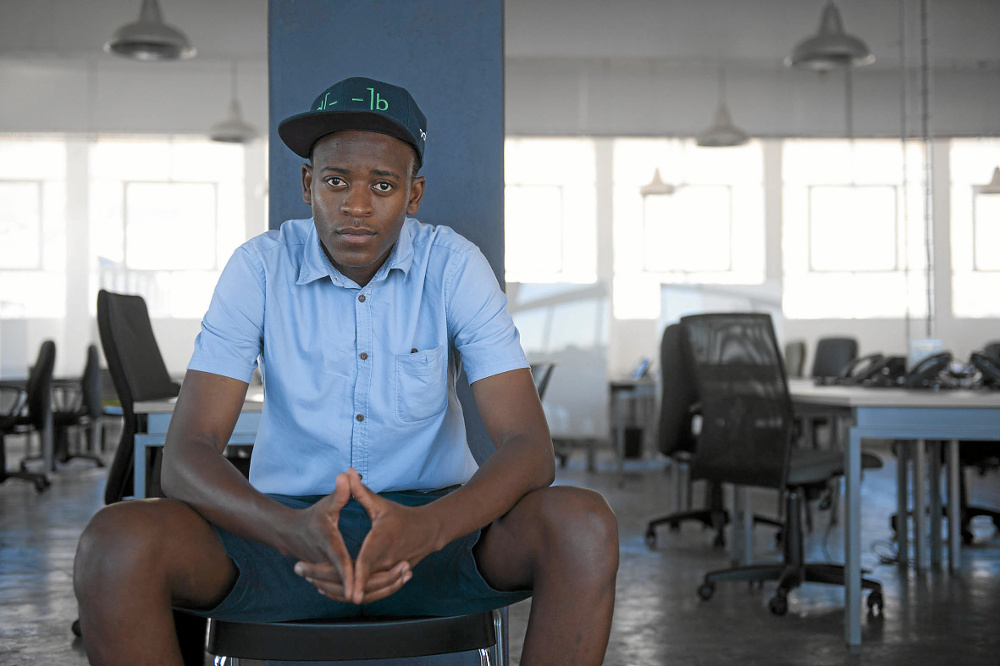Bright idea: Michael Suttner inventer of the Lightie
For 27-year-old Michael Suttner, inventor of the Lightie, the light bulb moment came on his way to gym. For three years he had been working on prototypes for a low-cost solar light that was small, lightweight, durable, bright and long-lasting. It was only when he stopped off to buy water that the idea of an empty plastic bottle struck him as the perfect container for a test-tube-shaped solar-powered unit – cheap and easily accessible.
You leave the solar-powered unit in the sun for eight to 10 hours, then pop it into a soda bottle and screw on the cap. This sets off up to 20 hours of bright light, which you can change to a lower brightness and get 40 hours of light by slightly loosening the cap.
Retailing for between R100 and R120, with mass production aimed for July, the Lightie will be available anywhere you can buy Coke. Visit thelightie.com and follow @theLightie and @Msutter on Twitter.
Waterless bath
A light bulb went on for University of Cape Town student Ludwick Marishane (23) when a lazy friend said: "Why doesn't someone invent something you can put on your skin instead of bathing?"
DryBath, the gel Ludwick came up with after research on Google, gets rid of both body odour and bacteria, a potentially life-saving factor for rural communities. Manufactured in Somerset West, and selling well abroad after having won many awards, it retails for R35 on the website, inclusive of worldwide delivery. Visit headboy.org.
Ecofriendly stove
Ruan van Rooyen's ecofriendly Mbaula Green stove has been recognised as a World Design Capital (Cape Town) 2014 project. This portable stove burns wood or charcoal inside a heat-retaining clay liner that requires very little burning fuel to sustain high temperatures.
It emits less carbon and is safe to use – "especially for rural Africa where inefficient cooking methods lead to injury, smoke pollution, and homes being burnt down," says Ruan (25). Meals can be cooked in a pot or pan, or braaied on a fitted grill.
Mbaula Green is a Western Cape 110% Green flagship, and a member of the United Nations' Global Alliance for Clean Cookstoves. The galvanised Mbaula is R599 and the stainless steel Mbaula is R998. Visit mbaula.co.za.

Ludwick Marishane, inventor of the bathing gel. Photograph by David Harrison, M&G
Solar pack
The sight of a young girl studying by the light of a street lamp is what motivated Billy Hadlow to develop a solar pack that could supply energy to a house. His Khaya Power – a recycled five-litre plastic container converted into a solar energy power pack – is another of the World Design Capital 2014-recognised projects. It can power LED lights, a small TV, a DVD player, a radio and a cellphone charger.
"Customers pay a deposit and can exchange the pack for a recharged unit at a local spaza shop. The cost is R100 deposit and R12 per recharge. Energy lasts for three to four days – running a light for six hours a day and three cellphone charges," says Hadlow.
Based in Stellenbosch, Hadlow has so far built 240 units. Since winning a Mail & Guardian Greening the Future award last year, he has designed a stove powered by Khaya Power, using compressed sawdust. Visit khayapower.co.za.
Water filter pump
Micah Donnoli's manual seesaw-style Phuza Pump is another World Design Capital 2014-recognised project. It's a pump that filters impure water.
About half a metre long, you stand on it with your legs on either side, moving your weight from one to the other – "in a little dance if you feel so inclined," says Micah – as it sucks in dirty water on one side, and pumps it through a filter to come out purified on the other.
Donnoli (25) was an industrial design student at the Cape Peninsula University of Technology when he and fellow student Alika Dobie developed the water purification idea for informal settlements.
"Capital input was required to make the rubber meet the road and the product was put on hold," he says. "Now there's a potential investment opportunity from Sanlam to develop the prototype."
Donnoli has also invented a bait hood for the long-line fishing industry to reduce accidental catching of seabirds, and a tricycle with a built-in plastic bottle crusher to collect waste.
Smokeless geyser
Hot water 24 hours a day is what Jannie Schonken's smokeless geyser can provide for off-grid families. Named the Shiza Manzi (Hot Water), the geyser works on natural fuels such as mealie cobs, dried cattle dung, sticks and forest waste and can boil 25 litres of water in 10 to 12 minutes – eight times faster than the average household kettle.
"The advantages," says Schonken, a steam fitter who lives in Odendaalsrus, "are that Shiza Manzi is easy to install, doesn't require sunlight or high-pressure water and is made of stainless steel to ensure years of corrosion-free water.
"It works by dropping dry biofuel into the combustion chamber and igniting it with a piece of paper or small bundle of grass. The water surrounds the combustion chamber so it heats quickly, and the geyser ignites its own smoke, making the system almost smokeless."
Shiza Manzi has received an Eskom eta award, and has been tested by the South African Bureau of Standards and the universities of Johannesburg and the North West. Units retail at R3 900. Visit shizamanzi.co.za.